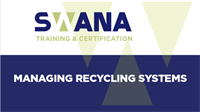Questions About Certification?
Get and Stay Certified




SWANA Certification: Professionalism, Recognition, Knowledge, Achievement, Leadership
SWANA certification is recognized by numerous states as the standard for solid waste employees.
Whether you’re just starting the journey or well on the path of becoming successful in the solid waste profession, SWANA Certification is your guide to career enhancement, increased salary, and greater success in your chosen discipline.
SWANA credentials are earned through education, experience, and challenging program of examinations and maintained through continuous review and education.
Please review the experience requirements closely for the discipline(s) in which you seek certification. If you do not have the requisite experience, your application will be denied.
Certification Information
Certification empowers you with the latest information, creates networking opportunities with fellow professionals, and identifies you as an asset to the industry.
Ready to Get Certified?
Visit our Become Certified page and follow three easy steps to register for certification.
- Login or create a SWANA account
- Apply for certification online
- Register for online testing
Application Costs*
Members: $250.00
Non-members: $400.00
* Certification and recertification fees do NOT cover your SWANA membership fees.
Learn More About SWANA Certification Disciplines
Managing Recycling Systems

Design and Develop a Sustainable Recycling Program
This course focuses on recycling materials found in municipal solid waste (MSW) generated from residential, commercial, and institutional sources, not including hazardous wastes, household hazardous wastes, or special wastes. The course provides information on successfully planning, developing, marketing, and managing recycling programs. Managing Recycling Systems also addresses collection, processing, application of end-use standards, and protection of human health and the environment.
Who Should Attend
Facility owners, operators, manufacturers, managers, supervisors, and employees involved in the daily operation of a recycling facility or program.
Course Objectives
Upon completion of this course, learners will be able to:
- Describe the elements associated with designing and developing a sustainable recycling program
- Determine acceptable material quality and requirements for existing and emerging markets
- Apply quality requirements and regulatory standards of a “Buy Recycled” program
- Identify program costs and revenues required to develop a funding
- Establish and manage contracts for recycling services
- Select the appropriate tools for recyclable collection
- Plan an education and outreach program
Course Content
The course consists of lectures, class activities, exercises, and a facility tour (when available in proximity to the class location) to see theory in everyday practice. The text for the course, Managing Recycling Systems, is a comprehensive manual that details the following topics with supplemental images, graphs, examples, and exercises. It serves as a must-have on-the-job reference tool.
- Planning a Recycling Program
- Funding a Recycling Program
- Developing and Researching Recycling Markets
- Collection and Processing of Recyclable Materials
- Planning an Education and Outreach Program
- Establishing and Managing Contracts for Recycling
- Applying End-User Standards and Quality Requirements for Recycled Products
- Managing Recycling Programs to Protect Human Health and the Environment
Benefits of Being Certified
Why SWANA Certification is important and beneficial to employees and employers:
Employees —Get Certified and Shift Your Career into High Gear!
- Accelerate your career
- Increase job mobility
- Command higher salary
- Prove your skills & expertise
- Demonstrate pride in your work
- Gain competitive advantage over non-certified individuals
Employers —SWANA Certification Produces Results for Your Organization!
- Leverage best practices for improved operations
- Equip employees with knowledge
- Reduce down-time from regulatory violations
- Show customers your commitment to quality
- Gain competitive advantage in bids & contracts
- Inspire employee pride in work
Advertisement







